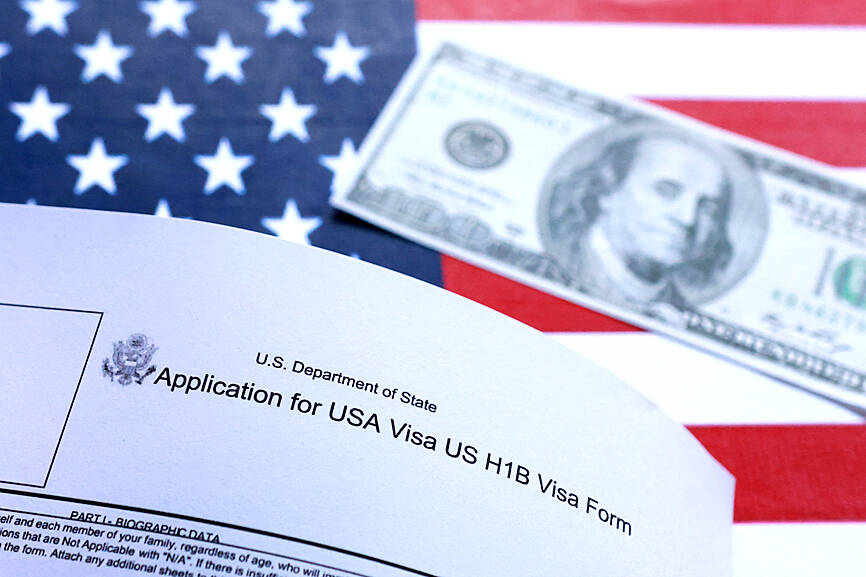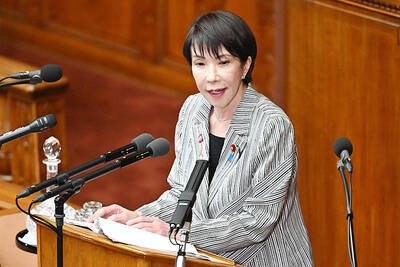Applicants for immigrant visas to the US could be rejected if they have chronic medical conditions, such as diabetes or obesity, under a new directive from the US Department of State, US media outlet KFF Health News reported on Thursday.
The policy directs visa officers to deny applicants who might rely on public benefits due to health issues, age or their financial situation, the article said.
Sent to department employees through an internal cable, the guidance said that these people could become a “public charge,” or a drain on US public resources.

Photo: REUTERS
“Certain medical conditions — including, but not limited to, cardiovascular diseases, respiratory diseases, cancers, diabetes, metabolic diseases, neurological diseases and mental health conditions — can require hundreds of thousands of [US] dollars’ worth of care,” the cable said.
While the US visa application process has included a health screening for years, checking for communicable diseases such as tuberculosis and obtaining vaccine history, the new guidelines expand the medical conditions to be considered and give officers more power to make decisions based on the applicant’s health status, the article said.
The guidance even encourages officers to consider obesity, which it said can cause asthma, sleep apnea and high blood pressure, KFF said.
The change is part of US President Donald Trump’s “divisive and aggressive campaign to deport immigrants living without authorization in the US and dissuade others from immigrating into the country,” it said.
The cable directs officers to develop “their own thoughts about what could lead to some sort of medical emergency or sort of medical costs in the future,” even though they have no medical training.
Visa officers were also asked to consider if the applicant has the means to pay for medical treatment without help from the US government.
The cable’s language appears at odds with the Foreign Affairs Manual, the State Department’s handbook, which says that visa officers cannot reject an application based on “what if” scenarios, said Charles Wheeler, a senior attorney for the Catholic Legal Immigration Network.
In its coverage of this story published on Friday, the Hill said that the first Trump administration shifted public charge policies, expanding those who would be considered a drain on government resources.
The administration of former US president Joe Biden unwound this public charge rule, but the second Trump administration is again expanding the definition to dissuade immigrants from coming to the US, the Hill said.

The Central Weather Administration (CWA) yesterday said it expected to issue a sea warning for Typhoon Fung-Wong tomorrow, which it said would possibly make landfall near central Taiwan. As of 2am yesterday, Fung-Wong was about 1,760km southeast of Oluanpi (鵝鑾鼻), Taiwan’s southernmost point, moving west-northwest at 26kph. It is forecast to reach Luzon in the northern Philippines by tomorrow, the CWA said. After entering the South China Sea, Typhoon Fung-Wong is likely to turn northward toward Taiwan, CWA forecaster Chang Chun-yao (張峻堯) said, adding that it would likely make landfall near central Taiwan. The CWA expects to issue a land

Taiwan’s exports soared to an all-time high of US$61.8 billion last month, surging 49.7 percent from a year earlier, as the global frenzy for artificial intelligence (AI) applications and new consumer electronics powered shipments of high-tech goods, the Ministry of Finance said yesterday. It was the first time exports had exceeded the US$60 billion mark, fueled by the global boom in AI development that has significantly boosted Taiwanese companies across the international supply chain, Department of Statistics Director-General Beatrice Tsai (蔡美娜) told a media briefing. “There is a consensus among major AI players that the upcycle is still in its early stage,”

‘SECRETS’: While saying China would not attack during his presidency, Donald Trump declined to say how Washington would respond if Beijing were to take military action US President Donald Trump said that China would not take military action against Taiwan while he is president, as the Chinese leaders “know the consequences.” Trump made the statement during an interview on CBS’ 60 Minutes program that aired on Sunday, a few days after his meeting with Chinese President Xi Jinping (習近平) in South Korea. “He [Xi] has openly said, and his people have openly said at meetings, ‘we would never do anything while President Trump is president,’ because they know the consequences,” Trump said in the interview. However, he repeatedly declined to say exactly how Washington would respond in

Japanese Prime Minister Sanae Takaichi said yesterday that China using armed force against Taiwan could constitute a "survival-threatening situation" for Japan, allowing the country to mobilize the Japanese armed forces under its security laws. Takaichi made the remarks during a parliamentary session yesterday while responding to a question about whether a "Taiwan contingency" involving a Chinese naval blockade would qualify as a "survival-threatening situation" for Japan, according to a report by Japan’s Asahi Shimbun. "If warships are used and other armed actions are involved, I believe this could constitute a survival- threatening